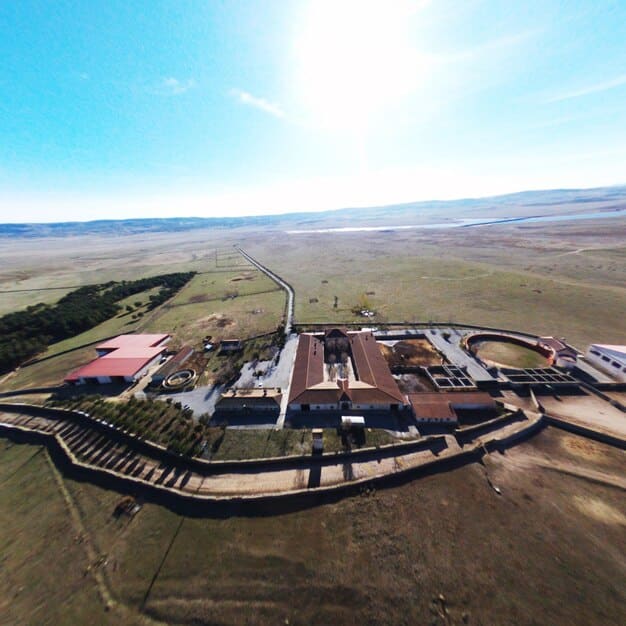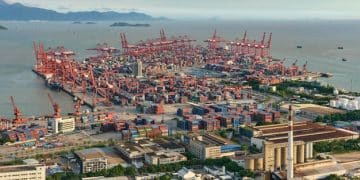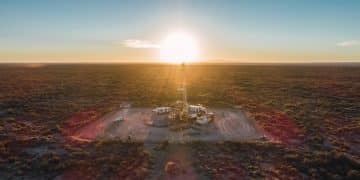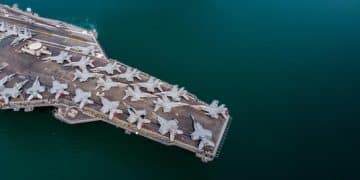US Investment in African Infrastructure: Geopolitical Risks & Rewards

US investment in African infrastructure presents a complex web of geopolitical risks and rewards, influencing not only economic development but also strategic alliances and regional stability.
Investing in African infrastructure holds immense potential, but it’s a venture fraught with geopolitical complexities. Understanding the geopolitical risks and rewards of US investment in African infrastructure is crucial for informed decision-making.
The Allure of African Infrastructure Investment
Africa is experiencing rapid urbanization and economic growth, creating significant demand for infrastructure development. This demand spans various sectors, including transportation, energy, and communication, which present investment opportunities for the US.
The potential returns on investment in African infrastructure are substantial. However, these opportunities are intertwined with geopolitical risks that require careful consideration.

Economic Opportunities in Key Sectors
Several sectors present compelling investment prospects. Understanding these opportunities is vital for aligning investments with strategic goals.
- Transportation: Investing in roads, railways, and ports enhances connectivity and facilitates trade, driving economic growth.
- Energy: Developing renewable energy sources and power grids addresses energy deficits and supports industrialization.
- Communication: Expanding broadband infrastructure bridges the digital divide and enables access to information and services.
These sectors are crucial for Africa’s sustainable development and offer viable avenues for US investors.
In conclusion, the allure of well-funded and targeted investment in African infrastructure is real, driven by the continent’s need for modernization and the potential for high returns.
Geopolitical Risks: A Complex Landscape
Investing in African infrastructure is not without its challenges. Geopolitical risks can significantly impact investment outcomes.
Understanding these risks is essential for mitigating potential losses and ensuring long-term success.
Political Instability and Governance
Political instability, corruption, and weak governance can undermine infrastructure projects. Investors must navigate these challenges carefully.
- Regime Changes: Unstable governments can lead to policy shifts and project cancellations, impacting investment security.
- Corruption: Bribery and embezzlement divert resources, increasing project costs and reducing efficiency.
- Weak Institutions: Inadequate legal frameworks and regulatory oversight create uncertainty and hinder project implementation.
Addressing these challenges requires robust due diligence and risk management strategies.

Geopolitical risks, including political instability and governance issues, can deter investment in Africa.
China’s Growing Influence: A Counterbalance
China’s expanding presence in Africa presents both opportunities and challenges for US investment. Understanding China’s role is crucial for developing effective strategies.
China’s Belt and Road Initiative has led to substantial infrastructure development in Africa, often with less stringent conditions than Western investments.
Strategic Competition and Collaboration
The US and China can engage in healthy competition to provide better infrastructure solutions for Africa. However, collaboration is also possible in certain areas.
Navigating this dynamic requires a nuanced understanding of China’s objectives and capabilities.
China’s growing influence presents both a challenge and an opportunity, demanding a balanced approach from US investors and policymakers.
Security Concerns and Conflict Zones
Security threats, including terrorism and armed conflicts, pose significant risks to infrastructure projects. Investors must assess and mitigate these risks.
Conflict zones disrupt project timelines, increase costs, and threaten the safety of personnel.
Risk Mitigation Strategies
Effective security measures are essential for protecting infrastructure investments. These measures include:
- Security Assessments: Conducting thorough risk assessments to identify potential threats.
- Community Engagement: Building strong relationships with local communities to foster trust and cooperation.
- Security Partnerships: Collaborating with local security forces and private security firms to enhance protection.
Security concerns are a serious threat that demand a proactive and comprehensive approach.
In summary, a deep understanding of local factors and partnerships with established firms are critical for maximizing the rewards and mitigating the risks of infrastructure investment in Africa.
The Role of Development Finance Institutions
Development Finance Institutions (DFIs) play a crucial role in mobilizing capital for infrastructure projects in Africa. These institutions provide financing, guarantees, and technical assistance.
DFIs can help de-risk investments and attract private capital to projects that might otherwise be considered too risky.
DFIs as Catalysts for Investment
DFIs can act as catalysts for investment by:
- Providing Long-Term Financing: Offering loans with longer tenors and more favorable terms.
- Sharing Risks: Providing guarantees and insurance to mitigate political and credit risks.
- Offering Technical Assistance: Providing expertise in project development and implementation.
Collaboration with DFIs can enhance the viability and sustainability of infrastructure investments.
The utilization of DFIs, combined with policy reforms, can foster a more attractive investment climate and drive long-term economic development across the continent.
Policy Recommendations for US Investment
To maximize the benefits of US investment in African infrastructure, policymakers should implement targeted strategies. These strategies should address key challenges and leverage opportunities.
Support for policy reforms, increased transparency, and stronger partnerships are essential for creating a more favorable investment climate.
Enhancing Investment Climate
Several policy recommendations can enhance the investment climate:
- Promote Good Governance: Support efforts to combat corruption and strengthen institutions.
- Improve Regulatory Frameworks: Streamline regulations and reduce bureaucratic hurdles.
- Provide Risk Mitigation Tools: Offer guarantees and insurance to protect against political and economic risks.
Implementing these recommendations can attract more US investment and support sustainable development outcomes.
Case Studies: Successes and Failures
Examining past infrastructure projects in Africa provides valuable lessons. Analyzing successes and failures can inform future investment decisions.
Case studies highlight the importance of good governance, community engagement, and risk management.
Lessons Learned from Past Projects
Past projects illustrate the following key lessons:
- Community Involvement: Engaging local communities ensures projects align with their needs and priorities.
- Transparent Procurement: Promoting transparency in procurement processes reduces corruption and enhances efficiency.
- Environmental Sustainability: Integrating environmental considerations minimizes negative impacts and promotes long-term sustainability.
Learning from past experiences is crucial for maximizing the positive impacts of infrastructure investments.
| Key Point | Brief Description |
|---|---|
| 🌍 Investment Opportunities | Huge potential in transport, energy, and communications sectors. |
| ⚠️ Geopolitical Risks | Political instability, corruption, and security concerns impact investments. |
| 🇨🇳 China’s Influence | China’s Belt and Road Initiative presents competition and collaboration opportunities. |
| 🤝 DFIs’ Role | Development Finance Institutions mobilize capital and de-risk investments. |
Frequently Asked Questions
▼
Key sectors include transportation (roads, railways, ports), energy (renewable sources, power grids), and communication (broadband infrastructure), all vital for sustainable development.
▼
Political instability, corruption, weak governance, and security threats are significant risks that can undermine project success and investment security.
▼
China’s Belt and Road Initiative creates both competition and collaboration opportunities, necessitating a nuanced understanding of their objectives and strategies.
▼
DFIs provide vital financing, guarantees, and technical assistance, helping to de-risk investments and attract private capital to otherwise risky projects.
▼
Promoting good governance, improving regulatory frameworks, and offering risk mitigation tools are key policies to attract more US investment and ensure sustainable outcomes.
Conclusion
US investment in African infrastructure presents a complex but potentially rewarding landscape. By understanding the geopolitical risks, leveraging the role of DFIs, and implementing sound policies, the US can contribute to Africa’s sustainable development while advancing its own strategic interests.





